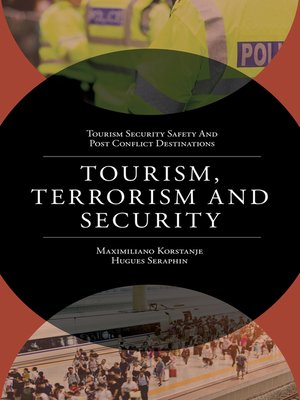Tourism, Terrorism and Security
ebook ∣ Tourism Security-Safety and Post Conflict Destinations
By Maximiliano E. Korstanje

Sign up to save your library
With an OverDrive account, you can save your favorite libraries for at-a-glance information about availability. Find out more about OverDrive accounts.
Find this title in Libby, the library reading app by OverDrive.



Search for a digital library with this title
Title found at these libraries:
| Library Name | Distance |
|---|---|
| Loading... |
The tourism industry has evolved and maturated over the recent years. Today, tourism is not only a leading industry but also a consolidated commercial activity worldwide. Unfortunately, the turn of the century has accelerated a number of global risks, placing the tourism industry in jeopardy. Scholars adopted an economics-based paradigm, which has focused on the commercial nature of tourism as a benefactor of local economies, while terrorists are depicted as the enemies of democracy. This begs the question: are tourists cultural ambassadors of their respective societies?
Tourism, Terrorism and Security explores the current limitations of specialized literature to frame an all-encompassing understanding of tourism and security today. The main thesis of this book explores the idea that while tourists are workers who need to validate their political institutions through the articulation of leisure practices, terrorists are natives from the societies they hate. Terrorism has imposed a climate of mistrust, whereby tourists are targeted and killed to impose a political message.
This book explores the semantics of this message. Tourism, Terrorism and Security is a must-read for students and scholars of tourism, hospitality, security, and cultural studies.
Tourism, Terrorism and Security explores the current limitations of specialized literature to frame an all-encompassing understanding of tourism and security today. The main thesis of this book explores the idea that while tourists are workers who need to validate their political institutions through the articulation of leisure practices, terrorists are natives from the societies they hate. Terrorism has imposed a climate of mistrust, whereby tourists are targeted and killed to impose a political message.
This book explores the semantics of this message. Tourism, Terrorism and Security is a must-read for students and scholars of tourism, hospitality, security, and cultural studies.







